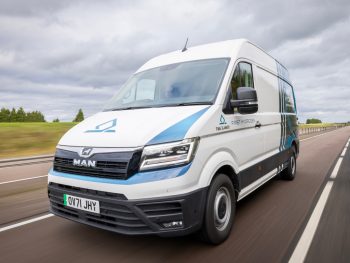First Hydrogen optimises LCV efficiency ahead of fleet trials
First Hydrogen is optimising the efficiency of its zero-emission light commercial vehicles ahead of their deployment with fleet customers from the end of March 2023.
Revealed last year, the pair of fuel cell vans are expected to have a 400-600km range (around 250 to 370 miles) and are currently undergoing mileage accumulation and vehicle evaluation to optimise efficiency.
Conducted with the powertrain specialists at AVL, the tests will put the vehicles through a range of real-world duty cycles, including urban, rural and highways routes to accurately determine fuel consumption and vehicle range in different driving scenarios.
The research will enable automotive and energy developer First Hydrogen to utilise AI for predicting energy consumption, optimising fuel efficiency and identifying areas for further development. The data will capture real-world capabilities of the company’s future zero-emission vehicles, including its Generation II concept vehicle.
The process also enables comparison to simulations made for the Worldwide Harmonised Light Vehicle Test Procedure (WLTP) testing, which is part of EU law.
Initial figures are expected by mid-March 2023 and First Hydrogen expects the figures to showcase the vehicles’ competitive Total Cost of Ownership (TCO), while also allowing potential customers to draw true comparisons between fuel cell electric vehicles (FCEVs), battery electric vehicles and vehicles with internal combustion engines.
The tests will complete before First Hydrogen deploys its two vans for trials with major fleet operators in the UK as part of a programme with the Aggregated Hydrogen Freight Consortium (AFHC).
The operational trials start from late 20 March and offer companies such as national supermarkets, utilities, roadside assistance, and healthcare providers the chance to experience zero-emission LCVs alongside their own fleets.
Stephen Pendrey, chief engineer for First Hydrogen Automotive, said: “These tests are an important part of our vehicle development and help us to ensure the vehicle is performing as efficiently as possible and in line with expectations. The data enables us to factor in vehicle weight and payload to calculate the amount of energy used for propulsion.
“The results provide verifiable data on expected range per kilogram of hydrogen used. This information shows commercial vehicle owners and fleet managers the output they can expect in specific conditions and illustrates the financial benefits of switching to a FCEV.”


